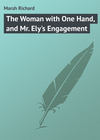Buch lesen: «The Woman with One Hand, and Mr. Ely's Engagement», Seite 5
CHAPTER X
THE JEWEL KING
The story of Duncan Rothwell's murder, when it came to be unfolded in a court of law, proved to be not the least strange of the many strange tales which have been unfolded there. Its turnings and twistings and involutions were many, but briefly summed up it came to this:
The man who had married the landlady of that hotel in the turning off the Strand, and who, in marrying her, had brought such havoc on her head, turned out to be a man with many names. What his real name was, if he ever had one, was never clearly shown. But there had been a time during which the name by which he had been best known to a certain section of society had been that of the "Jewel King." He had been the perpetrator of most of the remarkable jewel robberies which have so much disturbed society during recent years-a scamp, in short, on a truly notorious scale. Jonas Hartopp had played receiver to his thief. These two had been really remarkable men-men of parts which, fortunately for the world at large, are not often found joined in two individuals.
For years these two had been close friends-colleagues-with souls but for a single thought, which thing was plunder, until a woman came between. This was the woman who has figured in these pages as Mrs. Lascelles-Trevor, but whose real patronymic was shown to be rather more plebeian-Amelia Martin. The man who, for the sake of convenience, I will continue to call Mr. Barnes, was in his way a genius, and a little mad. He lived for a long time with Amelia Martin as her husband, without ever having married her. It is probable that during the whole of this period the woman was in a state of daily and hourly terror. He had a pleasant habit of playing tricks with women, particularly mesmeric tricks, of a sort which would hardly have endeared any husband to any wife. It was seriously alleged, for instance, that on a Monday he would throw her into a mesmeric sleep, and leave her quite alone in the house, and in a state of trance, until he returned on the Saturday to restore her, at his leisure-very much at his leisure-to a condition of consciousness. Thus she was continually losing large slices out of her life, under circumstances which no one could describe as wholly satisfactory.
By degrees she transferred her affections to Jonas Hartopp, and with them she decided to transfer herself as well. Mr. Barnes had just made a great coup. The world will remember the disappearance of the Countess of Crawley's wedding presents. Mr. Barnes walked away from Crawley House with those priceless gems packed comfortably away in his pockets. Amelia Martin persuaded Jonas Hartopp to rob his friend, if, in a little transaction of that peculiar kind, one may speak of robbery. She offered Mr. Hartopp the Countess's gems for nothing if he would take her with them. In a weak moment Mr. Hartopp yielded to temptation. Unfortunately Mr. Barnes detected her in the very act of flight. She struck a blow for freedom-with a knife. The injury which she inflicted was, however, a superficial one. Before she could strike again he had her in a mesmeric sleep. While she was in that state he cut off at the wrist her right hand, the one with which she had tried to stab him. Restoring her, he showed her what he had done. In her agony she vowed that she would turn Queen's evidence and betray him to the tender mercies of the police, let the consequences to herself be what they might. In short, she made herself so extremely disagreeable that, all things considered, Mr. Barnes thought it the better part of wisdom to decamp.
It was while he was in full flight that he lighted on that hotel in the street off the Strand, on the landlady of which he so generously and rapidly bestowed the name of Barnes. He perfectly realised that his friend and his mistress were leagued together against him, and he took it that Barnes's hotel would form a convenient resting-place and cover until such time as he saw his way to crying quits with the pair.
It is here that the odd part of the story begins, having its origin in one of those freaks of coincidence which, after all, are not so common in fiction as they are in actual life, and are certainly not stranger. The soi-disant Mr. Barnes had, in his palmy days, taken up his residence for business purposes, of all places in the world, at Dulborough. Finding that there had been a James Southam thereabouts, and conceiving that it would be as well, in case of accidents, that the credit of his misdeeds should stand a chance of being fathered on the real James Southam instead of on the false one, he had not only taken to himself my name, but had actually located himself in the house in which I had been bred and born.
Jonas Hartopp regretted his treachery almost as soon as he had played the traitor. Either he did not find the lady such a good bargain as he thought he should, or, at any rate, not a commensurate exchange for the good offices of his ingenious and profitable friend. He decided after a while to extend the olive branch towards his whilom colleague. It was with that idea in view that he had inserted the advertisement addressed to James Southam, of Dulborough, which had caught my eye. Under the circumstances, when the newly-fledged Mr. Barnes, acting his rôle of waiter, heard the stranger on whom he was attending pronounce his quondam cognomen, it was not surprising that he jumped to the conclusion that the Philistines had tracked him to his lair, and that, in consequence, he turned tail and ran.
Amelia Martin, having played the part of traitor herself, was quick at suspecting intended treachery in another. She had an inkling of what it was Jonas Hartopp, alias Duncan Rothwell, proposed to do. The pair had a violent quarrel the night before he went to town. She followed him without his being conscious of the fact, on that eventful journey, in a dangerous mood; and in what, doubtless, was a moment half of fear and half of frenzy, she struck him dead. The evidence at the inquest, and the discovery that there was a real James Southam in the world, and that "Duncan Rothwell," therefore, had started on a futile quest, gave her the idea of removing suspicion from herself by attributing the crime to me-which ingenious plan she might have carried to a successful issue, and I been hanged for what I never had the faintest thought of doing, if the false James Southam had not come on the scene in the very nick of time. It was she who placed the knife with which she had done the deed behind the wainscot in my bedroom!
The trial of Amelia Martin for the murder of Jonas Hartopp, during which this tale was unfolded, continued for a week. On her behalf medical evidence was brought to show that she suffered from periodical attacks of mania, during which she could not justly be held responsible for her actions-for which condition of affairs Mr. Barnes's mesmeric experiments had probably something to do. She was sentenced to be confined as a criminal lunatic during her Majesty's pleasure.
Mr. Barnes's suicide in his cell, on the night before he was to be brought to trial-for, in spite of the assistance which he rendered in the case of Amelia Martin, the police, apparently, had no intention of letting him go "scot free" – was the sensation of a "special edition."
"Mrs. Barnes" sold the hotel and retired into private life. At present, I believe, she is residing with some relatives in a corner of far-off Canada. As for me, I still seem very far from being on the road which leads to the making of a fortune; but, at any rate, I am not at present out of employment, and I sincerely trust that the time is very far distant when I shall be.
The End
MR. ELY'S ENGAGEMENT
CHAPTER I
THE FIRST WOOER
Number Two, Draper's Gardens, the office of Mr. John Ash, dealer in stocks and shares. Time, noon. Mr. Ash, with his hat pushed on to the back of his head, seated at a table studying a letter.
"Whatever women find to write about beats me. A man puts a volume inside two lines. A woman puts two lines inside a volume."
Mr. Ash rustled the letter irritably in his hands. It was a voluminous production, written by a feminine pen, crossed and recrossed in a way which, in these days of cheap paper and cheap postage, none but a feminine pen would dream of.
"However a man is supposed to read it is more than I can tell. I can just make out the opening: 'My dearest guardian,'-yes, dear at any price! And the signature-where is it? I know I saw it somewhere. Yes, of course, there it is-straggling across the date and the address: 'Your affectionate ward, Lily Truscott'!"
He laid the letter down, and thrust his hands into his breeches-pockets, leaned back in his chair, and began to whistle softly beneath his breath.
"I wish I could get some one to marry her-a decent sort of man. Though, upon my word, if this sort of thing is to go on" – he glanced at the letter with a look of mild despair-"I sha'n't mind who it is. She knows I hate letters-that's why she keeps on writing them. If two men can't know each other without one of them dying and leaving the other with his daughter on his hands, no wonder a man likes to keep his circle of acquaintance small. And when the girl's got looks and money, God help the man who's got to stay and mind her! Well, here goes. I suppose I'll have to answer it, or she'll be writing again to-morrow to know if I am ill."
Taking up the letter he regarded it with a look of ineffable disgust.
"What she says I don't know. Rather than decipher these hieroglyphics I'd lose a hundred pounds. Anyhow, here goes to make the best of it."
Drawing towards him a sheet of paper and a pen he began to nibble the end of the pen.
"What the dickens shall I say? How can a man answer a letter when he doesn't know what is in it!"
He began to write, indulging in a sort or commentary by the way.
"My dear Lily, – I have read your charming letter with the greatest interest. (I have! I have!) You are indeed a mistress of the epistolary art. (I hope she won't imagine that's writ sarkastick. Now, what shall I say?) The account which you give of the doings of your neighbourhood (I hope that's safe-it ought to be, women always do talk about that kind of thing) is most entertaining. (Most!) It is with the greatest pleasure that I hear of your continuance in good health. (I wonder if she says anything about her being ill?) I am glad to hear, too, that your aunt, Mrs. Clive, is still in the enjoyment of nature's greatest blessing. (I wonder if she mentions the old girl's name!) Pray convey to her my compliments. (Old fool! Now for something to wind up with.) I envy you your peaceful sojourn amidst summer's scenic splendours. (Not so bad! 'summer's scenic splendours.') Tied as I am to the Juggernaut of commerce, I can, however, but look and long. (I wouldn't live in a place like that for thirty thousand a year.)
"Your affectionate guardian,
"John Ash."
"I think that'll do. It will, at any rate, prevent her writing again to-morrow to know if I am ill."
While he was examining, with a certain satisfaction, this example of polite correspondence, a voice was heard inquiring for him in the office without: "Mr. Ash in?"
When Mr. Ash heard the voice, an acidulated expression appeared upon his countenance.
"Ely! What does the fool want here? It's not so very long ago since I very nearly had to hurt his head."
"All right; you needn't trouble him. I'll show myself in."
The owner of the voice did show himself in. He was a dapper little man, with fair hair and a little fair moustache, the ends of which were arranged with the utmost nicety, and a pair of rather washed-out blue eyes, which could, however, look keen enough when they pleased. He was what might be described as a bandbox sort of man. Beautiful grey trousers fitted over exquisite patent shoes. A spotless white waistcoat relieved an irreproachable black coat. His necktie was arranged in an absolutely perfect little bow. His hat gleamed as though it had just that moment left the manufacturer's hands. He carried a metal pencil-case, and one of those long, thin note-books which gentlemen of the Stock Exchange use to enter their bargains in. A diamond ring sparkled on the little finger of his left hand, and in the button-hole of his coat, backed by a sprig of maiden-hair, was a sweet blush-rose.
This beautiful little gentleman seemed to be satisfied with himself and all the world.
"Surprised to see me, I daresay."
His rather metallic voice did not altogether accord with the radiancy of his appearance. One expected flute-like notes to come from him. His actual tones were sharp and shrill.
"I am; considering that last time I had the privilege of your conversation you were good enough to say I was a thief."
The dapper little man stood before the empty stove picking his beautiful white teeth with his metal pencil-case.
"Well, Ash, business is business, and no man likes to be robbed, you know."
"Is that what you have come to tell me? Because, if so, you can impart the information equally well while I am pitching you through the window."
The little man did not seem at all annoyed. He did not even seem amused. He appeared to be quite accustomed to that sort of speech. He seemed to take it for granted, at any rate.
"Well, no-quite the other way. Fact is, I'm looking for a wife."
"A what?"
"A wife."
"The deuce you are! And do you think I've a selection on view here?"
"Not a selection. You've got one."
"What the dickens do you mean?"
"Come, Ash, you know. It's your ward, Miss Truscott."
Mr. Ash gave a loud whistle of surprise. Then he turned in his chair and stared at the dapper little man. The dapper little man went on, in the calmest, matter-of-fact sort of way-
"The fact is, I'm sick of chambers, and I'm sick of dining at the club. I want a house, and I don't care to take a house unless I take a wife. Why shouldn't it be Miss Truscott, Ash?"
He paused as if for a reply. But if he did, none came.
"There's another thing. You know Rosenbaum?"
Mr. Ash signified assent.
"He wants to plant one of his girls on me. All six of them, so far as I can see. He's always shying them at my head. Besides, he's been hammered twice. If he went again, where should I be, I'd like to know. Not to mention that the whole six of them have got carbuncles instead of noses, and moustaches quite as good as mine."
"I did hear that you were engaged to a Miss Rosenbaum."
"Then you heard wrong; I ain't. Why shouldn't it be Miss Truscott, Ash? I've got something and she's got something. I tell you fairly, if she hadn't it wouldn't do. And if we pulled together, you and I, we might put something in each other's way."
He winked at Mr. Ash. Mr. Ash grinned, and turned aside. He regarded the letter on his desk.
"Have you spoken to her yet?"
"Not a word. I wanted first to have things clear with you. I'll run down to-morrow if it's all serene."
Mr. Ash appeared to be turning the matter over in his mind. "There's no man in England that girl need ask to marry her."
"I'm sure I never said there was."
"Ah, I daresay if you were to take nine men out of ten and heap them in a crowd, she might take her pick out of the lot!"
"If it comes to that, I might take my pick out of a few. Frederic Ely's a man who never need go begging."
Mr. Ash smiled. His smile was scarcely flattering to his friend. He continued to turn the matter over in his mind. Suddenly he got up.
"Ely, I like you. We've had our differences, but as you say, that's because we're both men of business, and like to see the entries on the right side of the ledger."
That was not exactly what Mr. Ely had said but no matter.
"Lily Truscott's a girl in a thousand-in million, sir. I know her-I know her well. There's nothing in that girl's heart which is hidden from me, and that girl's heart's all good, and that's something to say of a girl at this time of day. If she were my daughter, and I were her father, there's no man to whom I should be more willing to give her, sir, than you. Take her, sir; take her! and I wish you joy!"
He turned away, but whether it was to hide a tear or even some deeper sign of heartfelt emotion, is a difficult thing to say. Mr. Ely did not appear much touched.
"That's the time of day, old man. You send her along a line to say I'm on the road; prepare her mind, you know."
If Mr. Ash did not know, at least Mr. Ely winked.
"I'll be up in time. If you write to her now, she'll get it the first thing in the morning, and she'll have time to settle herself before I come. Ta, ta! See you in the house!"
Mr. Ely moved towards the door. Mr. Ash spoke to him just as he reached it.
"How about that Erie syndicate?"
Mr. Ely paused. He stared steadily at Mr. Ash's back.
For some reason Mr. Ash continued with his back turned away.
"You help me with this and I'll help you with that. I can't say fairer than that, my boy."
Apparently Mr. Ash did not seem to think he could, for when Mr. Ely was gone, and the door was closed, he indulged in a little quiet laughter. He reseated himself in his chair and began to nurse his knee.
"I think-yes-I think that will do. Ely's a curious combination; in business matters one of the shrewdest men I know, out of them one of the greatest idiots on earth. However, I think that it will do. I'll just add a postscript to that letter of mine."
He drew the letter towards him, and to the end of it tagged the following-
"P.S. – By the way, a friend of yours-Mr. Frederic Ely-will be with you to-morrow morning-perhaps almost as soon as you get this. He is a gentleman for whose character I have the greatest respect. He will ask my dear Lily a question in which both he and I are deeply interested. I earnestly trust that my dear Lily's heart will answer 'Yes.'"
He scanned the P.S. with admiring eyes.
"I call that neat but not gaudy. None of the awful guardian there. And, upon my word, I don't see why she shouldn't have him; one idiot's as good as another, and if he chooses he can be as good as a hundred thousand pounds to me."
Folding the letter, he placed it in an envelope and addressed it: "Miss Truscott, The Cliff, Shanklin, Isle of Wight." While he was still engaged in this proceeding, the clear, ringing tones of a man's voice was heard in the outer office, and for the second time that morning the door of Mr. Ash's sanctum was unceremoniously opened, and, again unannounced, a second visitor came in.
CHAPTER II
THE SECOND WOOER
A very different visitor this to the first. A tall, stalwart fellow, with a guardsman's chest, a long fair beard which hid his neck, and a huge pair of the most ridiculous moustaches. No bandbox fellow he! Dressed in a shooting suit, crowned by a soft, deer-stalker's hat, flourishing what was a bludgeon rather than a stick in his hand, he seemed hardly the type of figure which is generally to be found in the neighbourhood of Capel Court.
"Hallo, Ash, tracked you down, old man."
His voice was like himself: there was plenty of it. It should have been worth a fortune to him on the Stock Exchange.
"Summers! Whatever brings you here?"
"What doesn't often bring a man to the City-love, and my lady's eyes."
"What!"
Mr. Ash fairly sprang out of his chair. He stared at his visitor with bewildered surprise.
"You may well stare, and stare your fill. I'm worth staring at to-day, for I just don't feel as though I know whether I'm standing on my head or heels. The greatest stroke of luck has happened to me that ever happened to a man before-I've sold my picture for a thousand pounds."
"You've done what?"
"Ah, I knew you wouldn't believe it. It does sound incredible, doesn't it? But it is a fact, though, all the same. I've sold my New Gallery picture, 'A Dream of Love: an Idyll, by William Summers,' for a thousand pounds."
"And have you come all the way to Draper's Gardens to tell me so? It's very good of you, I'm sure.
"It would be good of me if that was all, but it's not; there happens to be more. What does that sale mean? It means that I've made a hit-that I've got a commission for another at the same price-that my fortune is made. I'm a man of fortune, sir."
"I assure you I am very glad to hear it; but I hope you will excuse my mentioning that I still have my fortune to make, and that this is the busiest hour of the day."
"All right, wait half a jiffy, man. Keep yourself in hand, for upon my soul I can't. What does my being a man of fortune mean? It means that I have become a marrying man-a man who has a right to marry. So I'm going to marry."
"I congratulate you with all my heart. Do I know the lady?"
"Well, rather, considering that she's your ward."
"What!"
"Miss Truscott's going to be my wife. I thought I would just drop in and let you know."
"Drop in and let me know! If this isn't the coolest proceeding I ever heard of in my life!"
The amazed Mr. Ash stared at his visitor, who seemed, so to speak, to be laughing all over his face. Then he dropped into his chair, and stared at the addressed letter which lay upon his desk. He appeared to be conscious of a certain confusion of mind.
"Good gad!" he told himself; "just now I was wishing that some one would come along and marry her. This is a case of one's wishes being too plentifully granted. It strikes me there's one too many."
Then he addressed himself to his visitor aloud-
"Really, Mr. Summers, I fail to understand you."
"It's plain enough."
"It may be plain enough to you. You must allow me to say that it is anything but plain enough to me. May I ask when you made what I must call this surreptitious request to my ward for her hand?"
"Oh, that's just the point. I haven't spoken to her yet."
"You haven't spoken to her yet! I understood you to say that she was going to marry you?"
"That's right enough-so she is."
"This may be plain enough to you, but it is really getting still less plain to me. You evidently think that her guardian's consent is not required. May I ask if you think that the lady's is unnecessary too?"
"There are more things in heaven and earth than are dreamt of in your philosophy-I see that plainly, Ash! Don't you know that there is a language more eloquent than speech? That it is possible for a man and woman to understand each other perfectly and yet not interchange a word? We understand each other like that, my friend."
"I should be sorry to say anything which might lessen your self-conceit, but I think you are mistaken, Mr. Summers."
"Oh, no, I'm not."
"But I say you are! Hang it, sir, I never saw a more 'Came, saw, and conquered' style about a man before. If I were you, I would wait for victory to forward your despatch. As it is, I happen to know that Miss Truscott is engaged already."
So saying, Mr. Ash slipped his letter into the inner pocket of his coat.
"What!"
"For goodness' sake, Mr. Summers, don't shout the ceiling down! You will have the people coming in from the street, not to speak of the clerks outside."
"If I didn't know that you meant it for a jest, I should say it was a lie."
"You may say exactly what you please, it won't alter the fact."
"The fact! You call that a fact! I'll go down to Shanklin by the next train, and learn the truth from her own lips."
Mr. Summers made for the door, but Mr. Ash interposed; he was conscious that it would be advisable to induce this impetuous suitor to hasten slowly.
"One moment, Mr. Summers. I am sure you would be unwilling to do another an injury, even unconsciously. If you will restrain your impatience I will endeavour to explain to you exactly how the matter lies."
"How the matter lies? That's just what it does do-it lies! Or some one does, at any rate."
"Mr. Summers, you are a man of honour-we are both men of honour, I trust. Would you have me break my plighted word?"
"Break your plighted word? That depends. If you've plighted your word to break my heart, by George! I'd have you break it, then!"
"Let me remove this matter from the realms of romance into the regions of common sense."
"When you City men begin to talk about common sense you mean something very common indeed."
"Mr. Summers, this is a very solemn subject to me."
"Solemn subject to you! I wonder what sort of subject you think it is to me. Is she going to be my wife or yours?"
"Miss Truscott will be the wife of neither."
"Won't she? By George, we'll see!"
Again Mr. Summers made helter-skelter for the door. Again Mr. Ash made haste to interpose.
"If you will permit me to speak half a dozen consecutive words without interruption, I will make it plain to you that what I have at heart is the interest of all concerned."
"Except me! Never mind, I'll listen. Out with your half a dozen words."
Mr. Summers dropped into a chair in a way which must have been a severe test of its solidity, and brought his bludgeon down upon the floor with a bang. Mr. Ash started. He felt that this was a sort of suitor he had not bargained for.
"The case in a nutshell is simply this. Just before you came there was a gentleman here who made exactly the same proposal you have done. He, too, solicited the honour of Miss Truscott's hand."
Mr. Summers was up like a rocket. Again his bludgeon came down with a bang.
"The devil there was! Confound his impudence! What was the scoundrel's name?"
"The scoundrel's name is immaterial. The point is that I agreed that he should go down to Shanklin to-morrow, and, in proper form, make to the lady the offer of his hand."
"To-morrow, did you? Then I am off tonight."
"Still one moment, Mr. Summers, if you please. You appeared to be so certain of the lady's affection that I was scarcely prepared to find you so alarmed at the prospect of a rival in the field."
"Alarmed! Not I! I will back my darling's truth against the world!"
"Then supposing, instead of confining yourself to words, you prove your faith by deeds. Let this man try his luck to-morrow. If he fails, there is the next day left for you.
"Look here, Ash; when he's failed, will you consent to Lily being mine?"
"If he fails and Miss Truscott gives her consent, then I will."
"Then it's agreed! To-morrow, the beggar shall have his chance! The day after, I'll try mine."
Just then the door opened and Mr. Ely appeared. Mr. Summers rushed to him with outstretched hand.
"Hallo, Ely, haven't seen you for an age! You're looking queer! You ought to try a change of air."
"Think so? To-morrow I'm going out of town."
"Are you? That's odd! The day after I'm going too."
These remarks were exchanged while the two gentlemen shook hands.



















